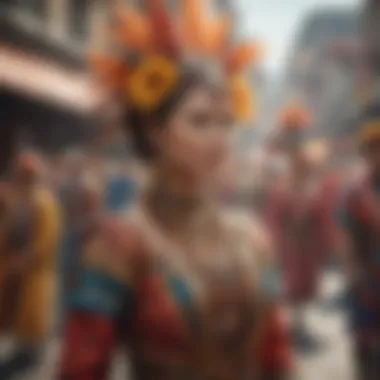Understanding Holidays and Celebrations: Their Cultural Significance


Nature Topic Overview
Holidays and celebrations play a vital role in cultures around the world. They mark significant events, promote community bonding, and often reflect historical narratives. These observances can range from religious festivities to secular events. Understanding their nature reveals the underlying values and shared identities within various communities.
Throughout history, each culture has developed its own unique set of traditions. These oftentimes stem from ancient practices or significant historical moments. As societies evolve, so do their celebrations, adapting to modern values while maintaining roots in the past. The interplay between tradition and contemporary society reveals much about human nature and our collective journey.
Key Themes
- Cultural Identity: Holidays often reflect the values and beliefs of a community, providing a sense of belonging.
- Historical Context: Many celebrations are tied to significant events in a culture's history, offering insights into their evolution.
- Psychological Impact: Participating in holidays can foster happiness, community ties, and a sense of purpose.
- Global Variations: While celebrations differ across cultures, many share common themes, such as gratitude, remembrance, and joy.
Fun Facts and Trivia
- Did you know that the word "holiday" comes from "holy day"? It reflects the religious origins of many celebrations.
- The Chinese New Year is celebrated for 15 days and is based on the lunar calendar.
- In Mexico, the Day of the Dead honors deceased loved ones and blends indigenous and Spanish traditions.
These facts help children learn about the diverse ways that people celebrate and the meanings behind those celebrations.
The Essence of Celebrations
Festivals bring people together. They allow families and friends to connect, share food, behave differently, and create memories. Every celebration has unique activities, like parades, dances, or feasts. These activities hint at a culture's history and values. For example, Ramadan is observed by Muslims worldwide, emphasizing reflection, charity, and community.
"Celebrations bind communities together, developing a shared sense of belonging and identity."
Culmination
Understanding holidays and celebrations is essential for appreciating different cultures. Each observance tells a story, highlighting past events and modern meanings. The evolution of these festivals illustrates how societies adapt and thrive while preserving history.
As we dive deeper into this article, we will explore specific celebrations from around the world, analyzing their cultural significance and impact further.
The Essence of Holidays and Celebrations
Holidays and celebrations form a core part of human culture. They allow communities to come together, sharing experiences that deepen their collective identity. Understanding these elements is essential when exploring the role they play in various societies.
Defining Holidays and Celebrations
Holidays are specific days set aside for observance, often tied to historical or religious events. They can be governmental, like Independence Day, or cultural, like Christmas. Celebrations, on the other hand, are the actions or festivities that occur during these defined periods. This distinction is crucial in understanding how these observances manifest within different cultures. The definition shapes how people participate and interact with each other during these important times.
Cultural Significance
Holidays and celebrations reflect the values and beliefs of a community. They serve as a medium through which individuals express their cultural identities. Many holidays have deep historical roots that connect people to their past. Among various cultures, there are specific themes that emerge, such as gratitude, remembrance, or renewal. These themes contribute to a sense of belonging among community members. For example, Diwali signifies the victory of light over darkness, a concept that resonates universally.
"Celebrations not only mark significant occasions, they also reinforce cultural continuity and social cohesion."
Common Themes Across Cultures
Though holidays vary greatly, certain themes are found across many cultures. Some of these common themes include:
- Family togetherness: Many celebrations center around families gathering to strengthen bonds.
- Tradition and customs: Rituals often accompany holidays, providing structure and meaning to the event.
- Gratitude and sharing: Many celebrations focus on giving, whether through food, gifts, or time.
- Remembrance: Some holidays commemorate significant historical events or individuals, reminding people of their shared history.
These commonalities across diverse cultures contribute to a broader understanding of what it means to celebrate. Individuals can find similarities in what might seem like disparate traditions, promoting a more connected global perspective.


Historical Context
Understanding the historical context of holidays and celebrations is crucial for recognizing their significance today. Every celebration has roots in specific events, cultural practices, and social norms that have evolved over time. These historical origins provide a framework for interpreting how and why certain traditions form and persist. This context helps us grasp the uniqueness of each holiday while also revealing common threads across different cultures. It shows how societies have used celebrations as a means of expressing values, beliefs, and identity.
Origins of Major Holidays
The origins of major holidays reflect a combination of historical events, religious practices, and seasonal changes. For instance, Christmas has its roots in both pagan winter solstice celebrations and early Christian traditions. Similarly, Diwali has origins in Hindu mythology, signifying the triumph of light over darkness. These holidays often mark significant moments in history, bringing communities together to remember and celebrate their shared heritage.
Common themes can be derived when studying the origins of these holidays:
- Religious Foundations: Many holidays stem from the beliefs of different religions, offering a chance for worship and reflection.
- Agricultural Significance: Certain events connect to harvest cycles, like Thanksgiving in North America, which emphasizes gratitude for the harvest and surrounding abundance.
- Invisible Markers of Time: Holidays often serve as a way to measure time, marking the end and beginning of seasons, which helps in the organization of communal life.
Evolution of Celebrations Over Time
Celebrations are not static. They adapt over time, influenced by changing societal norms, technology, and globalization. For instance, cultural celebrations can change significantly depending on migration and intermingling of cultures. The celebration of Halloween, tied to ancient Celtic traditions, has transformed into a largely commercial event promoting costumes and candy.
As societies evolve, so do their celebrations. The way people engage in holidays now differs from previous generations. People today often celebrate through digital means, organizing events via social media. This shift provides accessibility but can also dilute traditional practices.
Key factors that contribute to the evolution of celebrations include:
- Technological Advancements: Technology alters how communities celebrate, from coordination to communication.
- Cultural Exchange: Interaction among diverse cultures can lead to hybrid celebrations that incorporate various traditions.
- Changing Values: Societal values evolve, influencing how holidays are celebrated and what aspects are prioritized.
"The evolution of celebrations is a mirror reflecting the changes in society, revealing shifts in values, beliefs, and technologies."
In summary, the historical context of holidays and celebrations shapes their meanings today. Understanding the origins and evolution of these observances enriches our comprehension of cultural significance and identity.
Psychological and Social Impacts
Understanding the psychological and social impacts of holidays and celebrations is crucial in grasping their overall significance in various cultures. These observances are not merely dates on a calendar. They can shape relationships, influence emotional well-being, and drive community identity. By exploring these elements, one can appreciate how deeply entrenched these traditions are in human life.
Emotional Well-being and Holidays
Holidays often serve as a refuge from the stresses of daily life. They provide a chance to disconnect from routine pressures and reconnect with loved ones. During such times, feelings of joy and happiness tend to peak. Studies show that people who celebrate holidays experience increased satisfaction in their lives.
Moreover, these celebrations help in marking life transitions such as birthdays or anniversaries. Recognizing these milestones contributes to a sense of continuity and belonging. When children participate in holiday traditions, they often develop a positive identity connected with their culture. This can foster self-esteem and resilience, essential traits for navigating life's challenges.
Social Bonds and Community Identity
Celebrations often bring people together, emphasizing the importance of community. Sharing experiences, whether it be through food, music, or rituals, strengthens the bonds among individuals. This social cohesion plays a vital role in maintaining community spirit.
Community identities are also reinforced through traditions. For example, celebrations such as Diwali in India or Thanksgiving in the United States are not just personal events; they are steeped in shared history and values. As families and communities come together during these occasions, they create a collective narrative, fostering pride and unity.
Rituals and their Effects on Behavior
Rituals associated with holidays serve more than just aesthetic purposes. They can significantly influence behavior, creating a sense of predictability and comfort. For children, participating in rituals can establish a framework for understanding their cultural heritage.
Rituals promote meaningful actions that reinforce social norms and values. For instance, making a New Year resolution can encourage personal growth and commitment, while communal prayers can foster a sense of solidarity and peace. By regularly engaging in these rituals, individuals contribute to and nurture their cultural fabric, ensuring continuity through generations.
"Holidays and celebrations are a vital part of our social experience, acting as a bridge between personal identity and community belonging."
Global Celebrations: A Comparative Study


Understanding the Global Celebrations offers insights into how diverse cultures express their values, beliefs, and traditions. This section focuses on the different ways people around the world mark significant events in their lives. By exploring various celebrations, we can gain a deeper appreciation of our shared human experience, while also recognizing the unique aspects that define each culture.
Holidays in the Western World
In the Western World, holidays often reflect religious or historical events. For instance, Christmas and Thanksgiving are commonly celebrated in many countries, including the United States and Canada. Christmas commemorates the birth of Jesus Christ, blending both religious and cultural practices. Families typically gather to exchange gifts and share meals, reinforcing familial bonds.
Thanksgiving, on the other hand, is a time to express gratitude for the harvest and blessings of the past year. It involves feasting on traditional foods like turkey and pumpkin pie, emphasizing community and togetherness.
Western holidays also include secular celebrations such as Halloween and Independence Day. Halloween showcases creative costumes and traditions like trick-or-treating, while Independence Day celebrates national pride with fireworks and parades.
Traditions in Eastern Cultures
Eastern cultures exhibit a rich tapestry of traditions during their holidays. Festivals such as Chinese New Year or Diwali are characterized by vibrant rituals and communal celebrations. Chinese New Year, for example, is a time of family reunions, feasting, and honoring ancestors.
During Diwali, or the Festival of Lights, families illuminate their homes with oil lamps and fireworks to symbolize the triumph of light over darkness. Both holidays represent themes of renewal and hope, showcasing the importance of family ties and cultural heritage.
In Japan, New Year's Day, called Shogatsu, is a significant holiday where families prepare special meals, visit shrines, and engage in traditional games. These activities emphasize respect for tradition and community, while fostering connections among generations.
Indigenous Celebrations and Practices
Indigenous cultures around the globe have distinct ways of celebrating significant events, deeply rooted in their histories and environments. These celebrations are often tied to the seasons, nature, and spiritual beliefs. For example, the Native American Powwow is a gathering that includes dancing, singing, and storytelling, honoring cultural identity and history.
Furthermore, the Day of the Dead, celebrated in Mexico, pays homage to deceased loved ones. Families create altars, share memories, and enjoy festive meals, illustrating the connection between life and death.
These practices provide a sense of identity and continuity, highlighting the importance of preserving traditions across generations.
"Celebrations are not only about enjoyment; they are important expressions of cultural identity."
In summary, studying global celebrations reveals that, while customs may differ, the fundamental purpose of these holidays—strengthening community bonds, preserving traditions, and expressing shared values—remains universally significant.
The Role of Technology in Modern Celebrations
In recent years, technology has altered the way we celebrate holidays and occasions. From the way we organize events to how we share them, technology plays a vital role. Understanding this shift is essential for grasping the current landscape of cultural practices.
Digital Celebrations and Social Media
Holidays have become increasingly visible on social media platforms. Facebook, Instagram, and Twitter allow users to showcase their celebrations through posts, photos, and videos. These platforms enable a sense of connection, even among those who cannot be physically present. Users can share memories, express good wishes, and create digital art related to holidays.
Here are some benefits of social media in modern celebrations:
- Broader Reach: Individuals can share their festivities with friends and families across the globe.
- Real-time Interaction: Live streaming events allows friends and family to participate from anywhere.
- Creative Expression: People showcase their creativity through themes, decorations, and costumes.
However, there are considerations in the digital landscape as well. The pressure to present a perfect celebration online can lead to stress. It may detract from the authentic experience of the celebration.
Virtual Gatherings and Events
Virtual gatherings have gained prominence, especially following the pandemic. Tools such as Zoom, Skype, and Microsoft Teams have become common for hosting events. Families and friends can gather, regardless of distance, making the celebrations more inclusive.
Here are critical aspects of virtual gatherings:


- Accessibility: People with mobility issues or geographical constraints can join in celebrations that they might otherwise miss.
- Cost-efficiency: Virtual events often reduce the costs associated with travel and physical venues.
- Variety of Activities: Hosts can incorporate various interactive elements like games, quizzes, and performances.
Nevertheless, virtual celebrations can sometimes lack the personal touch of in-person interactions. Thus, it’s important for organizers to find a balance between the digital experience and the warmth of face-to-face celebrations.
The integration of technology in celebrations reflects changing societal norms and values, creating new traditions that blend the old with the new.
Challenges Facing Traditional Celebrations
The modern world presents several obstacles to traditional celebrations. These challenges demand attention as they affect cultural heritage and the way societies honor their customs. Understanding these challenges is crucial for nurturing the future of holidays and celebrations.
Globalization and Cultural Dilution
Globalization impacts how traditions are observed. Accessible communication and travel allow cultures to blend. This mixture can lead to cultural dilution. When traditional practices merge with popular ones, the core essence might be lost. For instance, a local festival may adopt elements from a global event, causing the original significance to fade.
- Loss of Authenticity: As cultural elements share space, some aspects might overshadow others. Unique customs may lose their visibility.
- Standardization of Celebrations: Major holidays like Christmas or New Year receive worldwide attention. Smaller, local holidays often struggle for recognition, leading to a narrow focus on global events.
- Catering to Global Audiences: Some celebrations might alter their traditional practices to appeal to diverse global audiences. This situation can compromise their unique cultural values.
The blending of traditions can have both positive and negative effects. While it might foster appreciation among different cultures, it can also lead to the erosion of a unique identity.
Environmental Impacts and Sustainability
The environmental effects of traditional celebrations can be substantial. Many holidays involve large gatherings or specific rituals that may not consider ecological well-being. The impact can manifest in several ways.
- Waste Generation: Large events often produce significant waste. Single-use decorations, food packaging, and leftover items contribute to landfills.
- Resource Consumption: Festivities may lead to increased energy use and food waste. For example, during large family gatherings, excess food can be overlooked and end up wasted.
- Pollution: Outdoor celebrations bring concerns such as noise and air pollution. Fireworks during certain holidays generate not only noise but also debris that affects local environments.
Finding ways to celebrate while being environmentally responsible becomes essential. Individuals and communities can take measures to promote sustainable practices. Some ideas include using eco-friendly materials or reducing waste through conscious planning. Overall, addressing environmental impacts is vital for preserving the traditions that form an essential part of many cultures.
"By acknowledging these challenges, societies can begin to adapt and maintain the essence of their celebrations while being mindful of their global and ecological responsibilities."
Traditions may need to evolve to include sustainability in celebration practices. Balancing heritage and responsibility is a worthwhile pursuit that can help preserve the cultural richness for future generations.
Future of Holidays and Celebrations
The future of holidays and celebrations offers significant insights into how societies dynamically evolve. As cultures merge and technology transforms interactions, the ways in which people celebrate will continue to shift. Recognizing these changes is crucial for understanding the ongoing relevance of holidays and their impact on global communities. The future holds opportunities for deeper connections and innovative practices that can enrich the celebratory experience.
While the essence of holidays might stay the same, how we observe them could look very different. Factors such as urbanization, migration, and increased global communication play a pivotal role in shaping future celebrations. This allows for the exchange of ideas and adaptation of various cultural practices. As a result, holidays can take on new meanings, blending traditions while respecting original customs.
Adapting to Changing Societal Norms
In a world where societal values constantly shift, holidays must adapt. Social movements, family dynamics, and individual beliefs influence the way celebrations are organized. For instance, in some societies, there is a growing focus on inclusivity. This means incorporating diverse cultural elements into traditional celebrations. A holiday that was once strictly observed within one cultural group may now embrace aspects from others.
Moreover, the role of technology cannot be understated. With the rise of remote work and virtual communities, many find joy in celebrating online. Such practices necessitate rethinking how we honor traditions. Some families may choose to combine online and offline elements, thus promoting stronger bonds despite geographical distance.
- Inclusivity in celebrations can lead to:
- Broader participation across cultures.
- More meaningful connections.
- An enriched understanding of what it means to celebrate together.
Innovations in Celebratory Practices
Innovative approaches to celebrations are changing how community events are realized. New tools and platforms facilitate diverse ways to connect during these special times. For example, interactive online events engage children and adults alike, creating shared memories even in a virtual environment. These practices reflect a movement toward technologically driven celebrations, mixing creativity and connection.
In addition, there is a noticeable trend towards sustainable celebrations. As awareness of environmental issues grows, many people choose eco-friendly methods for their festivities. This could mean:
- Reducing waste by opting for digital invitations.
- Using local food sources rather than importing items.
- Choosing gifts that promote sustainability or experiences over material goods.
Innovations in holidays, such as virtual reality experiences, can introduce participants to cultures they may not otherwise engage with, further bridging the gap between diverse groups.
The future of holidays and celebrations invites us into a dynamic world where creativity meets cultural respect. It ensures that traditions continue to thrive while adapting to the ever-changing global landscape.







